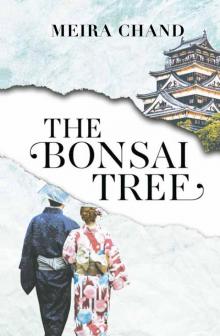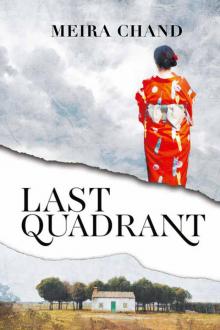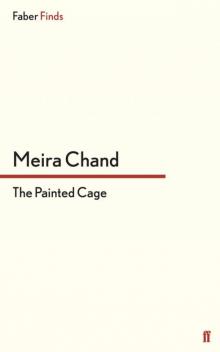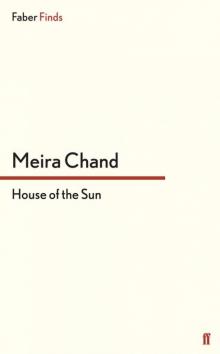- Home
- Meira Chand
House of the Sun Page 3
House of the Sun Read online
Page 3
‘Just be firm. The storm will blow over, as it is already about the meat,’ Jyoti encouraged.
‘Is it?’ queried Prakash.
‘He has eaten quietly in his room; he has made no fuss today. He is gaining equilibrium,’ Jyoti reasoned. She called to the servant to clear away the dirty plates.
Prakash nodded; probably Jyoti was right, she usually was. He was looking forward to offering his friends drinks from his own bar. He had already ordered his whisky on the black market and a whole range of liqueurs, including several of different colours which were to be poured slowly, in rainbowed layers, into one glass. Prakash swallowed apprehensively at the thought of explaining it to his father. He wished Jyoti would do it for him; she was clever at such things.
Jyoti had managed the change of diet in the house with cunning, first bringing in cooked meats from the bazaar in the form of mince patties and kebabs that would not offend as much as something of a more definitive nature. Lokumal was at heart a reasonable man; he decided not to notice. The occasional bringing in of such foods from outside, cooked in other kitchens, touched by other knives and pans, was no real taint to his own home, he argued with himself. Young people must be allowed some life of their own; they lived now in modern times. But two days ago there had been upon the table a dish of thick gravy, with fleshy lumps and yellow, hollow, long-cooked bones sticking out of it, that the cook informed Lokumal had been prepared in his own kitchen. Lokumal was aghast and ordered it off the table.
‘Just because I have never asked you to cover your head in respect before me in this house, you think you can now bring these ways into our family? Understand, what you were eating in your father’s house, you cannot eat here,’ Lokumal thundered at Jyoti.
‘The whole of my married life I have not eaten the food of my father’s house. The doctors say my blood has become thin,’ Jyoti protested.
‘I am telling you for your own good,’ Lokumal reasoned, calming himself with an effort. ‘You know these are hot foods, worse than eggs and onions, and are producing all kinds of unclean passions. Is any pure person eating meat? Is any swami or saint eating meat? Therefore India is leading the world in spiritual things, and all other countries have nothing but fighting and violence. Only because of eating meat,’ Lokumal declared. Jyoti clenched her fists beneath the table, Lokumal sensed trouble.
The next day a succulent aroma drifted through the house, and the irritable hiss of the pressure cooker lasted longer than usual. Informed by the cook that he had lost his battle, Lokumal refused to eat at the table. He sent a servant to the bazaar for a separate set of saucepans and kitchen knives, which were to be kept locked in his bedroom cupboard, and handed to the cook after the preparation of the family meal, for the cooking of his own vegetables. Afterwards they were to be washed and locked up again.
Jyoti cut into the apple. She pointed to a pink cardboard box on the table. ‘Those sweets were sent to us this morning by Mrs Murjani, to celebrate the engagement of her nephew. Daddy is very fond of that kind; I will take him some. You should have only one, an apple is healthier. You’re getting fat.’
Prakash reached across the table. He took possession of a sticky sweet, and pushed it into his mouth before Jyoti could order him not to.
In the distance the door bell rang; there were footsteps down the corridor. The living-room door was opened by a servant for a small, gnome-like man in a soiled white dhoti, a saffron silk shawl and a matching saffron knitted hat. He shuffled, eyes half-closed, past the table where Jyoti and Prakash sat eating, towards Lokumal’s door. The mumble of prayer escaped him, his hands were clasped before him and hidden beneath the shawl. The servant opened Lokumal’s door for the old-priest to enter.
‘What is Tunda Maharaj going in and out so often to Daddy for?’ Jyoti asked.
‘For someone of Daddy’s age and spiritual advancement there is nothing more in life but to think of godly things,’ Prakash replied.
The door bell rang again. Once more there were footsteps. The servant led in Mrs Hathiramani, wiping sweat from her upper lip with the end of her sari.
‘Oh ho. Still you are eating?’ she said, and unasked took a chair at the table. Jyoti pursed her lips.
‘Bring me water,’ Mrs Hathiramani ordered the servant. ‘It is too hot today. Again that donkey liftman is idling downstairs when he is needed for work. Yesterday also he did not come when I rang. He is wasting everyone’s money. Every day I must walk, up and down, up and down.’ The servant put a glass of water before Mrs Hathiramani and she drank thirstily. She wiped her mouth on the back of her hand and squinted at the table.
‘You also have received Mrs Murjani’s sweets? They are for her sister’s son’s engagement, you know. The girl is from Gibraltar. Where is this Gibraltar? Parents from Sukkur originally but now settled in this Gibraltar. They brought the girl here to Bombay, to find a boy for her, the way all Sindhis settled in Foreign do. These are not good marriages. Our boys here are pure, and girls brought up in Foreign are all too fast. And other way round too. When our girls from Bombay marry Indian boys from Foreign they get husbands who know only about drinking and bad women. So, now I hear you are eating meat?’ Mrs Hathiramani announced. Jyoti choked upon the apple.
Mrs Hathiramani continued. ‘Mr Hathiramani told me. He heard it from Gopal, the liftman. Only for these things is that donkey any good.’ She reached across to the open box of sweets and helped herself to one. ‘Mrs Murjani has sent you a half-kilo of sweets and to me she has sent only a quarter-kilo. Why does she make these differences? Does she think nobody will come to know? How can Dada Lokumal allow you to eat meat?’ Mrs Hathiramani inquired, sucking syrup from her fingers.
‘It is a matter of health,’ Prakash said, looking at Jyoti. She pulled a face behind Mrs Hathiramani; the cook must have told the liftman.
Mrs Hathiramani stood up. ‘I wish to speak to Dada Lokumal and Tunda Maharaj.’ She lumbered across the room to Lokumal’s door. Jyoti closed her eyes in relief.
*
‘Hare Ram,’ Mrs Hathiramani said in pious greeting as she entered the room. ‘Oh ho, Dada Lokumal, these are bad times.’ Everyone in Sadhbela called Lokumal Devnani, Dada, out of respect for his age and wisdom.
‘Come, daughter,’ Lokumal beckoned from where he reclined in loose, white garments, supported by bolsters, upon his bed. ‘What is it? Command us, and Tunda Maharaj will reveal what must be done.’ The priest looked up and grinned, showing toothless gums.
Mrs Hathiramani sat on the end of Lokumal’s divan and explained about Saturn in the House of the Sun. Just being in the presence of Lokumal made her feel better. His room was airy, with blue walls and a view of the sea. It served as Lokumal’s bedroom, his sitting room and his place of worship. All the paraphernalia of a religious life was crowded into it. The walls were hung with garlanded pictures of saints and Gods, two domed wooden house shrines held brass images of Krishna, dressed in scraps of lurex cloth. The esoteric odour of incense infused piles of religious books and pamphlets. It was not only the room but Lokumal himself who exuded an essence people never forgot. He was a man who had cast out of himself anger and desire. He had stepped away from the world’s limitations, and talked longingly of life in the ashram of Swamiji, the sage whose teachings he followed. He had retired from his business as a textile agent, handing over to Prakash, and was free at last to embark on a spiritual path.
His daily routine was severe. He took a cold bath at four each morning, then prayed and meditated. He retained a clean, starched look throughout the day as he sat on his white-sheeted divan, amidst many bolsters and the leafy piles of Swamiji’s writings. And all day people from Sadhbela, and the neighbouring buildings, came in a stream for advice, trapped still in their secular lives.
Lokumal listened intently while Mrs Hathiramani explained about Saturn. Tunda Maharaj also listened, withholding for the duration of her speech the soft whine of prayer that usually escaped him. He cocked his head at an angle, like a small bright
-eyed bird. His skin was wrinkled as a prune. The chair he sat upon was high and his legs, sticking out of the end of his dhoti, did not reach the ground. His feet were toeless and enclosed in black rubber shoes. He swung his legs vigorously about in agitation, as he listened to Mrs Hathiramani.
‘At once, when Bhai Sahib explained, I bought a sapphire from Mr Bhagwandas,’ Mrs Hathiramani said, digging down the front of her blouse to fish up the sapphire, wrapped still in crisp, magenta paper.
‘It cannot harm to do as Bhai Sahib says. He knows about these things,’ Lokumal nodded. ‘But, daughter, if you will put aside fear, nothing can harm you. Faith in God, not in a stone, will help you. In the Gita we are told, “The man who is ignorant, who has no faith, who is of a doubting nature, perishes. For the doubting soul there is neither this world nor the world beyond nor any happiness.”’
Mrs Hathiramani nodded. ‘I will not doubt, but I will wear the stone. If I do both these things, then nothing can harm me. Is that not right?’
Lokumal sighed resignedly. ‘Come now, why not show your hand to Tunda Maharaj? Let us see what he will reveal.’
Tunda Maharaj was Lokumal’s personal pandit, and had served the family for years. He came unannounced, at unpredictable times, from a village not far from Nagpur. He returned there as unpredictably, and would answer no summons of urgent need, for horoscopes or predictions. Lokumal had accepted these perversities on the part of Tunda Maharaj, as the way of a superior power to curb his own impatience. Tunda Maharaj was the only pandit who had been allowed to come and go in this manner. Before him there had been a Kala Maharaj, a Chota Maharaj, a Moti Maharaj and more. All these had lived in the broom cupboard of Lokumal’s home, a windowless recess to the right of the front door. Lokumal had installed an electric light and for air the door was left open. But each of these pandits had let Lokumal down in one way or another, absconding with money or foreign-made wristwatches, or fulfilling their duties lethargically. Only Tunda Maharaj had come up to Lokumal’s expectations.
Tunda Maharaj showed his toothless gums in a grin, and stopped swinging his legs about. He peered up at Mrs Hathiramani from beneath his knitted hat, worn through the winter and on those days when his head was newly shaved. Mrs Hathiramani fixed Tunda Maharaj with a look of disapproval, and stared at the bulge of his hands, clasped beneath his shawl. Tunda Maharaj, besides having no toes, had also hands without fingers. This sad state of amputation was the result of past leprosy. Tunda Maharaj hid his toeless feet in his rubber shoes and his hands beneath the saffron silk shawl. A single horny claw of nail protruded from one eroded fist. This he used to trace the lines of destiny he was asked to unravel, upon the palms frequently thrust before him. A strong smell of stale clothes and old coconut oil emanated from him. Mrs Hathiramani braced herself for the moment when he would reveal his twisted nail and trace it over her hand.
Once, Tunda Maharaj had fallen ill. During his visits to Bombay he stayed not with Lokumal, but in the Mahalaxmi temple. Mrs Hathiramani had gone there with Lokumal and Jyoti to see him. Tunda Maharaj always occupied the same place in the temple, a hut with walls of chipped, white tiles, with an uneven earthen floor, a small barred window and no door. Through the middle of the room grew a tree, a few knots upon its trunk providing resting places for Tunda Maharaj’s jute bag of belongings and his shawl. The branches of the tree spread out above the roof, full of noisy crows.
It had been monsoon time. The floor of the hut, knobbly with tree roots, had also been sticky with mud. Rain spat through a piece of oilcloth Tunda Maharaj had draped across his door, and poured through the holes in the roof on to his shawl and jute bag. A calendar showing Krishna playing his pipe was soaked. It was dark and evil-smelling in the hut; a wick burned weakly in a bowl of oil. Tunda Maharaj was delirious. Lokumal and Mrs Hathiramani had carried him out and sat him beside the driver in Jyoti’s car. They had taken him home, and ordered the servants to clear out the broom cupboard. They laid him on a blanket and called the doctor to him. He soon recovered and went back to the Mahalaxmi temple, but Mrs Hathiramani had never forgotten the sight of the bony stalks of his withered limbs. Half of each foot was eaten away, and tight balls of newspaper were stuffed into the fronts of his black rubber shoes. As she remembered these things, Mrs Hathiramani felt the light pressure of the old man’s claw. He mumbled through his gums; it needed Lokumal to interpret.
‘He says Bhai Sahib is revealing properly,’ Lokumal explained. ‘During these months you must do nothing to anger Saturn. Give to the poor and feed the cow with a wheatcake.’ Lokumal looked up at Mrs Hathiramani, his expression severe. ‘Tunda Maharaj will also perform some rites for you, for he says that already, under the influence of Saturn, the evil eye of someone close is upon you.’
‘Aiee,’ Mrs Hathiramani inhaled a frightened sob. ‘Why did Bhai Sahib not say anything of this to me?’
‘Perhaps he did not wish to alarm you,’ Lokumal suggested.
‘No, he could not see it. He is only a fool. Even his own grandchildren he cannot control,’ Mrs Hathiramani complained.
‘Now cease all this worry,’ Lokumal ordered. ‘You have commanded us; Bhai Sahib also you have commanded. No harm will come to you.’ Beside Lokumal, Tunda Maharaj opened his eyes and nodded.
*
When Mrs Hathiramani had gone, Lokumal leaned closer to Tunda Maharaj. ‘So, what have you deduced? Have you found the day?’ he asked, his voice low and urgent.
‘I have consulted the books. I have deduced the day. It will be the day of the commencement of the anniversary of Varsharambha. That is the exact moment when the sun returns to the same position it was at the time of birth.’ Maharaj shut his eyes and relapsed into prayer, his lips moving silently.
‘But only say, Baba, what is the day?’ Lokumal sighed impatiently.
‘The moon is the lord of the year. The sun is lord of the tenth house and occupies the ninth. It is in conjunction with Mercury, lord of the eighth house. It has been given the power of death.’ Marahaj closed his eyes.
‘The day, Baba.’
‘The eleventh of June.’
‘Hari Om,’ Lokumal sighed and sat back. Three months was all he had left. He had worked to know his own death day many weeks, pouring over intricate charts of ancient invention with Marahaj. To know the exact day was a great advantage. He could make sure it was a perfect death, as dictated by holy books. He turned his head to look out the window at the sea he loved. He never tired of its changing colours and moods, the glassy stillness of the early morning, or the thunder of waves in the blackness of night. He ached at the thought that he would see it no more; no longer watch the flocks of parakeets rise like a green cloud out of the trees in the gardens of nearby buildings.
He had wanted trees in the compound of Sadhbela. He had mentioned it at the blueprint stage but the numerous additions demanded by the co-operative society during the planning soon diminished the compound to a narrow patch before the building. In compensation a cactus was planted beside the entrance. Even this was ripped up when mothers complained of its prickly hazard to young children. Lokumal missed a view of trees.
In Sind, the garden of his home had been abundant in its vegetation and flowered with jasmine, gul-mohr, oleander, cassia and jacaranda. Each evening, in a cane chair upon his verandah, Lokumal had surveyed in their seasons the beauty of these blooms, treasuring the gentle perfumes. Through them, in the gathering dusk, he found that deep peace within himself that he valued above all else. He tried never to think of that garden, nor his violent departure from it. But now he remembered again the sweating bodies, the wild eyes, the feet that trampled down the flower beds and the flash of knives that had slashed and slashed, stabbing, killing, disgorging indiscriminately the innards of men, sofas or down pillows. He had run with his wife, clutching his children. His youngest brother lay dead in that garden behind them, stabbed to a pulp, forty-six times. He ran until he reached Bombay.
The Indus river still flowed through Sind, and the grea
t ruins of Mohenjo Daro still stood as proud proof of ancestry, but to Lokumal and the other residents of Sadhbela, that land had now faded to the substance of dreams. Those like Lokumal who remembered, spoke of it to their children in a Biblical way, as a land of milk and honey, lost and gone forever. Their faces grew sad when they spoke of Sind, but their children shrugged and laughed. They knew nothing but Bombay, sinful, lusty and full of excitements desired by the young. They yawned in the face of Sind.
To these young people Sadhbela was their only history. They knew little of those early, desperate days when, by different routes and with different experiences, they had all made their way south from Sind, to the mythical gold of Bombay. There, they made contact again with each other from the places where, crammed into niches and the corners of rooms, they lived on the kindness of friends. Then Lokumal, energetic and respected, mobilized a group of his exiled compatriots in a rehabilitation effort. Precious money was pooled for land and a contractor ordered to build. But, having erected with their money an apartment large enough to house himself and his family, the contractor refused to work any more. He too was a Sindhi of incorrigible genes. There was no money for legal dispute, so Lokumal had gone himself, taken the evil man by the collar and thrown him out, and after him his wife, his children and his cooking utensils. Then Lokumal and Mr Bhagwandas had occupied the empty rooms and not left them until a new contractor was found, and work was in progress again. They named the building Sadhbela, after an island in the Indus River between Rohri and Sukkur. The island had a famous saint, a white marble temple, gardens of peacocks and rare flowers. It had loomed in their minds as a symbol of all they had lost.
Sadhbela stood on a quiet sea road of palm trees, mango trees and government bungalows, at the lesser end of Malabar Hill. The surrounding buildings had large, airy rooms, but at Sadhbela they had been forced, by the desperation of so many, to divide the apartments again and again. The numbers on doors ran into the hundreds. In the cramped quarters behind were stowed away a multitude of people living huddled, but grateful, in a couple of rooms.

 The Bonsai Tree
The Bonsai Tree A Choice of Evils
A Choice of Evils Last Quadrant
Last Quadrant Sacred Waters
Sacred Waters The Gossamer Fly
The Gossamer Fly The Painted Cage
The Painted Cage House of the Sun
House of the Sun